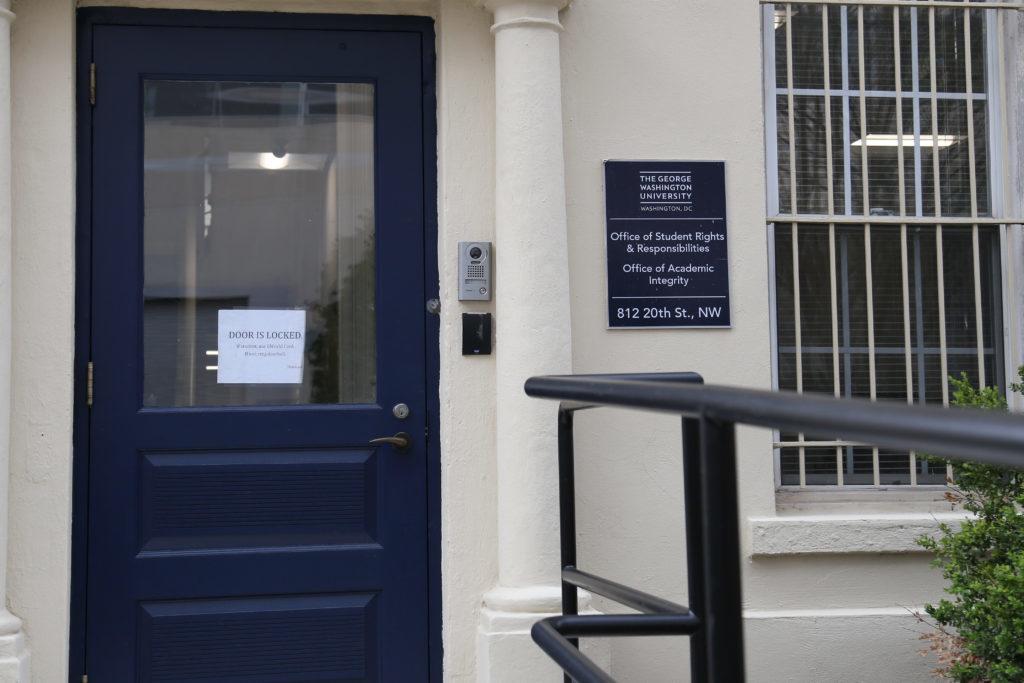Several employees left GW’s student conduct office this academic year, leaving some cases backed up and students saying they feel that their cases aren’t being handled in a timely way.
The Office of Student Rights and Responsibilities, which handles non-academic violations of the Student Code of Conduct, has been left “temporarily short-staffed” after employees left, Dean of Student Affairs Peter Konwerski said in an email last month. Student defense experts said a short-staffed student disciplinary office could mean cases’ processing are delayed or receive less attention than they require.
The office saw a “slight increase” in the number of conduct cases in the fall, Konwerski said. Konwerski declined to comment on how many staff members currently work in the office, how long on average the office takes to respond to cases, if the response time has changed and how many cases the office investigates each semester.
“It is the goal of the office to review cases in a timely manner in order to provide a student with information they need to be able to continue their academic endeavors,” he said.
Konwerski said the office is prioritizing hiring new employees and filling the vacant positions while focusing on more serious violation cases, which experts said likely include sexual harassment and assault cases.
In interviews, three students who were told they violated the code of conduct and deferred to the office said some phone calls and messages to the office went unanswered and that, in some cases, they had to wait months for their cases to be resolved. Students said the delays have left them feeling frustrated and worried because they do not know their punishments.
The Student Code of Conduct states that a deferral period, where disciplinary action is delayed, can last up to two semesters.
Sophomore Maggie Morris said that when she was found with a dog in her residence hall room in March, University Police Department officers told her to contact SRR for an academic violation – a violation the office does not look into – and potential punishment. She called the office the next day and left a message but has not heard back.
“It’s simply unprofessional to have them threaten students with these consequences when they’re not going to follow through,” she said.
A sophomore who spoke on the condition of anonymity said UPD officers caught the student twice with marijuana – once in her room and once outside – and referred the cases to SRR.
Nine days after the first incident last year, the student received a letter from the office telling the student to pay a $50 fine and take an online drug survey. A person caught with the student at the time was not notified of his punishment until 18 days after the incident, according to an email obtained by The Hatchet.
For the second violation, the student received an email 13 days after the incident from a SRR representative telling the student to schedule a mandatory meeting for the next day, according to an email obtained by The Hatchet.
“Right after you just get caught and you’re just like, ‘Well I have no idea what’s going to happen now,’ for two to three whole weeks,” the student said.
Another student, who spoke on the condition of anonymity, was suspended in March last year as a freshman after drugs were found in the student’s residence hall room.
The student said the SRR hearing process was not completed until two months after being referred to the office.
“It felt like it could have been handled in three weeks,” the student said. “The longer it takes for this process to be completed for each student, the worse it is for each student’s outcome.”
Brian Bregman, an attorney who specializes in student disciplinary defense, said if an office is understaffed, employees may rush cases and not handle all of them with due care.
“If there’s too much mail and not enough mail carriers, they’re going to end up grabbing the mail and mis-delivering it,” he said.
But Bregman said there could be a potential upside because smaller staffs can push offices to only investigate the most important cases and not spend time on incidents like underage drinking.
Peter E. Brill, a criminal defense attorney, said while the length of a case can vary among universities, cases are typically closed in one to two months. But if offices are understaffed, cases may be rushed or delayed – potentially causing students to lose money if they need to pay for tuition before cases are resolved, he said.
“Obviously justice wouldn’t be served in either case if it’s done shoddily,” he said.
Andrew Goudsward contributing reporting.





